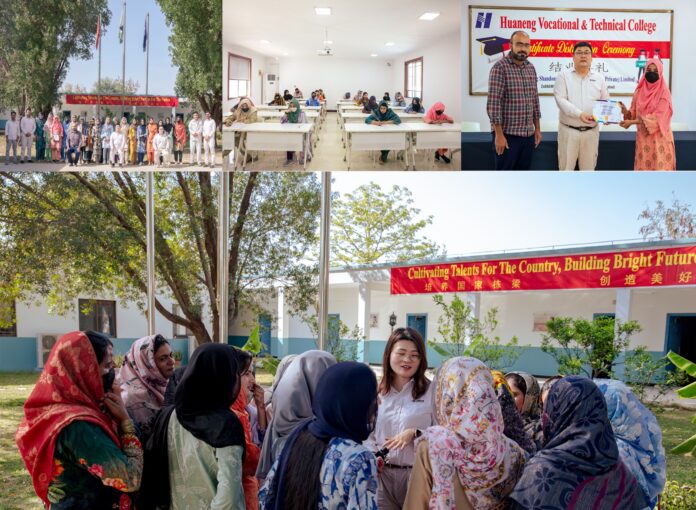ISLAMABAD, Apr 11 (APP): A Chinese proverb wisely states: “If you are planning for a year, sow rice; if you are planning for a decade, plant trees; if you are planning for a lifetime, educate people.”
In the heart of Punjab, near the 2×660MW Sahiwal Coal-Fired Power Plant, this philosophy is taking root in the form of sustainable community transformation.
Huaneng Shandong Ruyi (Pakistan) Energy (Private) Limited (HSRE), a pioneer in Pakistan’s energy sector, is channeling its corporate social responsibility (CSR) vision beyond electricity production.
Through the establishment of the Huaneng Pakistan Vocational & Technical College (HPVTC), the company is fostering hope, opportunity, and empowerment. This initiative, launched under a landmark agreement with the Government of Punjab, embodies the spirit of the China-Pakistan Economic Corridor (CPEC) by bringing high-quality, technical education to the region.
HPVTC is purpose-built to uplift unskilled and semi-skilled individuals through market-aligned training programs. Equipped with cutting-edge facilities and guided by an ethos of inclusivity, the college provides a transformative educational experience.
One of its standout initiatives is its dedication to women’s empowerment—a major step in a country where girls often face steep social and financial barriers to education, particularly in technical fields. In January 2025, HPVTC launched a free IT training course titled “IT Fundamentals & Applications”, exclusively for young women from surrounding communities.
The program, executed on April 7, 2025, proved to be life-changing for many participants, offering them not just skills, but dignity, confidence, and access to new futures.
The success of the IT course was marked by a heartfelt graduation ceremony, where key figures like Mr. Wu Xiaolong (Head of HPVTC), Mr. Chen Dapeng (Director HR, HSRE), and Mr. M. Haroon from the Trade Testing Board (Government of Punjab) honored the graduating students. Among the graduates was Ms. Zunaira Shafqat, who delivered an emotional speech, sharing how the training gave her more than just computer skills—it gave her the courage to dream.
“This training didn’t just teach us about computers,” she said, “it gave us a meaningful learning experience and helped us build confidence. For the first time, we feel prepared to compete in the digital world.” Her words resonated with the audience, affirming the deep societal impact of such grassroots initiatives.
Unlike private institutions that impose financial burdens, HPVTC has removed all major barriers to access. Students benefit from free tuition, registration, study materials (books, notebooks, stationery), pick-and-drop transportation, and nutritious lunches, along with free affiliations with the Punjab Skills Development Authority (PSDA) and the Trade Testing Board (TTB).
Additionally, educational excursions—such as industrial visits to the power plant—broaden student exposure and connect theoretical learning with real-world application. HPVTC’s commitment to inclusive, free education echoes another timeless Chinese proverb: “Give a man a fish, and you feed him for a day. Teach a man to fish, and you feed him for a lifetime.” These initiatives are transforming lives, particularly for young women, whose empowerment ripples through entire communities.
In a country where technical institutes offering free education are rare—and those focused on girls, even rarer—HPVTC is setting a new benchmark. The IT course, in particular, has been praised as a revolutionary step towards promoting gender equality in the fields of science, technology, engineering, and mathematics (STEM). Mr. Wu Xiaolong noted: “It is heartening to see so many young women confidently stepping into the world of technology. HPVTC is proud to be part of this transformation.” Echoing this sentiment, Mr. Chen Dapeng added: “We don’t just build power plants, we build people. When girls learn IT, they don’t just change their own lives; they uplift entire communities.”
Currently, HPVTC offers four short courses formally registered for the 2024–2025 session: Electrician, Welding, Chinese Language, and IT Fundamentals & Applications. These programs are supported by extensive infrastructure, including 49 operational training zones comprising lecture halls, simulation labs, practical workshops, and a library. Specialized facilities include the Virtual Reality Training Room, Electrode Baking & Tensile Testing Room, and Fabrication & Overhauling Workshops, providing immersive, real-world training. From its Language & Electrical Training Facility to Chemical, Mechanical, and IT Labs, HPVTC represents more than just a vocational institute—it is a beacon of sustainable development.
As HSRE’s CEO aptly stated: “The light we provide through electricity is temporary; the light we provide through education is eternal.” Indeed, through its cultural exchange, community uplift, and dedication to lifelong learning, HPVTC stands as a powerful bridge of progress between China and Pakistan.

